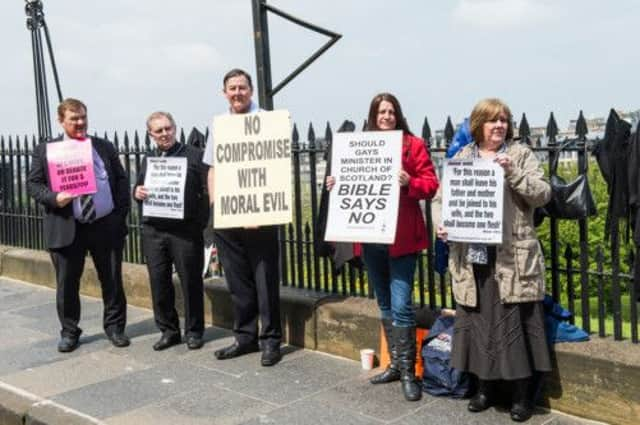Ministers face legal warning over gay marriage


The SNP government has insisted that individual celebrants would always be protected from being forced to take part in gay marriage ceremonies – even if their individual church has decided to “opt in” to the change.
The first same-sex marriages are likely to be held in Scotland in 2015 if laws currently going through parliament are passed. But the Church of Scotland has already said it may stop conducting weddings altogether amid concerns over the legal threat.
Advertisement
Hide AdAdvertisement
Hide AdChurches must opt-in before conducting gay marriages, under the terms of the Marriage and Civil Partnership (Scotland) Bill.
But MSPs on Holyrood’s equal opportunities committee heard this is unlikely to allow individual ministers to refuse to conduct a gay marriage on the grounds of religious conscience.
Aidan O’Neill QC, of Matrix Chambers, told MSPs he doubted that ministers could refuse to conduct gay marriage ceremonies if their church had opted in.
“That doesn’t seem to be possible,” he told MSPs.
Karon Monaghan QC, again from Matrix Chambers, also indicated that this safeguard could be open to challenge.
She said there would be a “difficulty” in saying, by law, churches that opt in to the same-sex marriage legislation should allow individual ministers the right to refuse to conduct them the grounds of conscience.
“That’s a question for the religious organisation, the church itself, not for the state,” she said.
“So to the extent that there’s vulnerability, that’s where it lies.”
But churches that opted out of marrying same-sex couples were unlikely to face a legal challenge on equality and human rights grounds, the MSPs were told.
Advertisement
Hide AdAdvertisement
Hide AdA challenge to the Church of England’s right to opt out may be “more plausible” because of its connection to the “English state”, according to Mr O’Neill.
“There is a difference, it has to be said, constitutionally between England and Scotland in terms of the relationship between the Church of England and its effective position, as it used to be the department of marriage for the English state,” added Mr O’Neill.
“There are arguments to the effect that the Church of England is a public authority when it carries out marriage because it has a duty in law to marry someone, no matter their faith, within their parish boundaries.
“That is not a matter of church law, it’s a matter of common law of England and backed up by the statutes that created the Reformation. In Scotland, we have a different relationship between the church and state. The Church of Scotland has never been a department of the state as we have always had this Calvinist notion of a separation of church and state, and marriage law has a completely separate history.”
Lynn Welsh, legal chief at the Equality and Human Rights Commission, said she believed the opt-in will work and will not be open to human rights challenge. “Obviously, someone could challenge it, but we don’t think they would be successful,” she said.
Kelly Kollman, lecturer in politics at University of Glasgow, said controversies in other countries over the issue died quickly.
“I know of no case where they have been forced to do same-sex marriages,” she said.
“In Scandinavian countries, most churches have opted in but they do allow people to opt out. But my understanding is that has worked relatively well.”
Advertisement
Hide AdAdvertisement
Hide AdA Scottish Government spokeswoman said: “We are putting in place very clear and robust protections for both churches and individual celebrants.
“Should a body choose to opt-in, there is no obligation on any individual celebrant of that body to take part.”